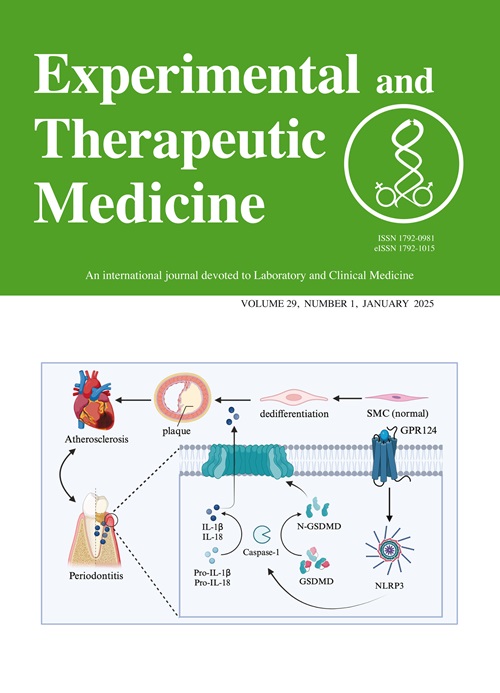比洛巴利特通过PI3K/Akt途径抑制TLR4-NF-κB信号传导,从而减轻脂多糖诱导的HepG2细胞损伤。
IF 2.3
4区 医学
Q3 MEDICINE, RESEARCH & EXPERIMENTAL
引用次数: 0
摘要
炎症参与了多种肝病的病理过程。比罗巴内酯(BB)是从银杏叶中提取的一种天然化合物,最近的研究表明,它能通过抑制肝癌细胞株 HepG2 的氧化应激发挥保肝作用。最近的研究也报道了 BB 的抗炎活性。本研究的主要目的是探讨 BB 能否减轻炎症相关的细胞损伤。用脂多糖(LPS)和BB培养HepG2细胞,并用MTT法测定细胞活力以评估细胞损伤。通过测量 IκBα、NF-κB p65、磷酸化(p)-IκBα、p-p65、p65 DNA 结合活性以及炎症细胞因子 IL-1β、IL-6 和 TNF-α 的水平,评估了 NF-κB 信号通路的活性。使用收费样受体(TLR)4 抑制剂(CLI-095)来检测 TLR4 参与 LPS 引起的细胞损伤。此外,还使用了 PI3K/Akt 抑制剂 LY294002 来探讨 PI3K/Akt 轴参与介导 BB 的效应。结果表明,LPS 会诱导 HepG2 细胞损伤。LPS 还升高了 p-IκBα、p-p65、p65 DNA 结合活性和炎症细胞因子的水平。然而,CLI-095 能显著减轻 LPS 诱导的细胞损伤,并抑制 NF-κB 信号的激活。BB 也剂量依赖性地减轻了 LPS 诱导的细胞损伤、NF-κB 信号激活和 TLR4 过表达。此外,还观察到 LY294002 削弱了 BB 对细胞损伤、TLR4 表达和 NF-κB 激活的细胞保护作用。这些研究结果表明,BB可通过调节TLR4-NF-κB信号转导来减轻LPS诱导的HepG2细胞炎症损伤。本文章由计算机程序翻译,如有差异,请以英文原文为准。
Bilobalide attenuates lipopolysaccharide‑induced HepG2 cell injury by inhibiting TLR4‑NF‑κB signaling via the PI3K/Akt pathway.
Inflammation is involved in the pathological process underlying a number of liver diseases. Bilobalide (BB) is a natural compound from Ginkgo biloba leaves that was recently demonstrated to exert hepatoprotective effects by inhibiting oxidative stress in the liver cancer cell line HepG2. The anti-inflammatory activity of BB has been reported in recent studies. The major objective of the present study was to investigate whether BB could attenuate inflammation-associated cell damage. HepG2 cells were cultured with lipopolysaccharide (LPS) and BB, and cell damage was evaluated by measuring cell viability using MTT assay. The activity of the NF-κB signaling pathway was assessed by measuring the levels of IκBα, NF-κB p65, phosphorylated (p)-IκBα, p-p65, p65 DNA-binding activity and inflammatory cytokines IL-1β, IL-6 and TNF-α. A toll-like receptor (TLR)4 inhibitor (CLI-095) was used to detect the involvement of TLR4 in cell injury caused by LPS. In addition, the PI3K/Akt inhibitor LY294002 was applied to explore the involvement of the PI3K/Akt axis in mediating the effects of BB. The results demonstrated that LPS induced HepG2 cell injury. LPS also elevated the levels of p-IκBα, p-p65, p65 DNA-binding activity and inflammatory cytokines. However, CLI-095 significantly attenuated the LPS-induced cell damage and inhibited the activation of NF-κB signaling. BB also dose-dependently attenuated the LPS-induced cell damage, activation of NF-κB signaling and TLR4 overexpression. Furthermore, it was observed that LY294002 diminished the cytoprotective effects of BB on cell injury, TLR4 expression and NF-κB activation. These findings indicated that BB could attenuate LPS-induced inflammatory injury to HepG2 cells by regulating TLR4-NF-κB signaling.
求助全文
通过发布文献求助,成功后即可免费获取论文全文。
去求助
来源期刊

Experimental and therapeutic medicine
MEDICINE, RESEARCH & EXPERIMENTAL-
CiteScore
1.50
自引率
0.00%
发文量
570
审稿时长
1 months
期刊介绍:
 求助内容:
求助内容: 应助结果提醒方式:
应助结果提醒方式:


